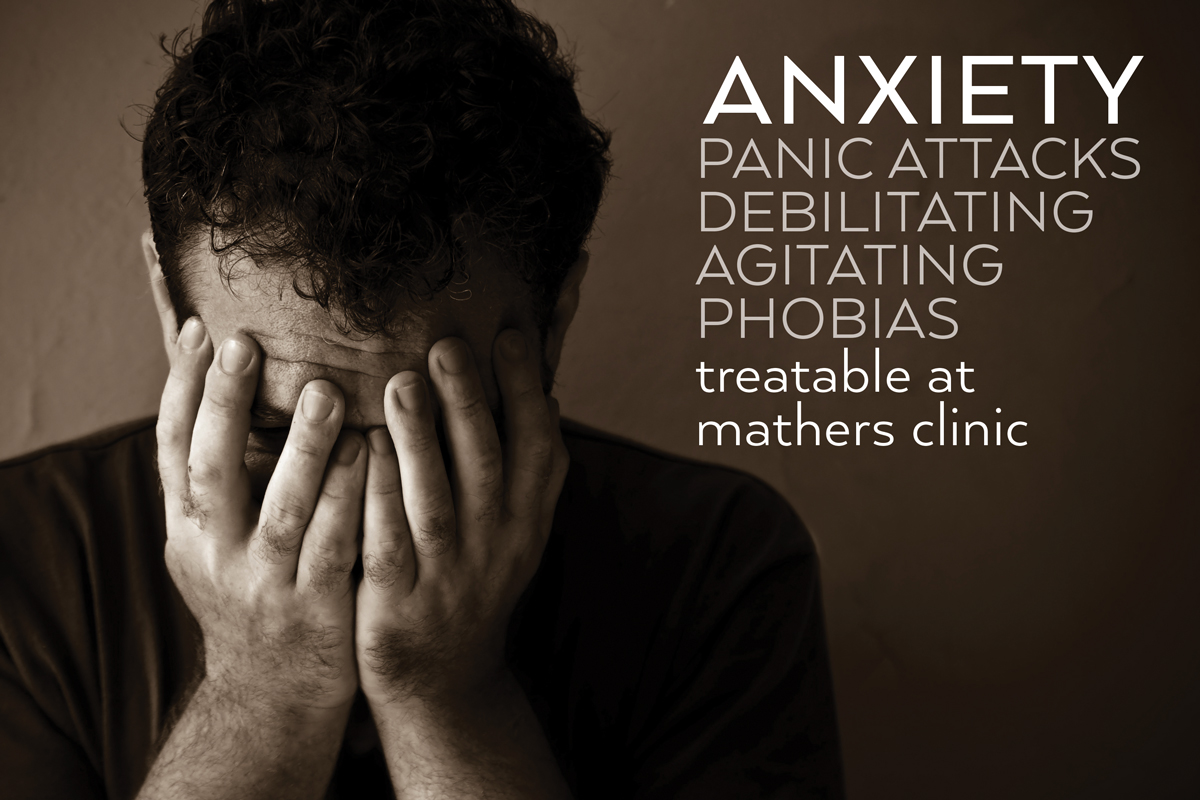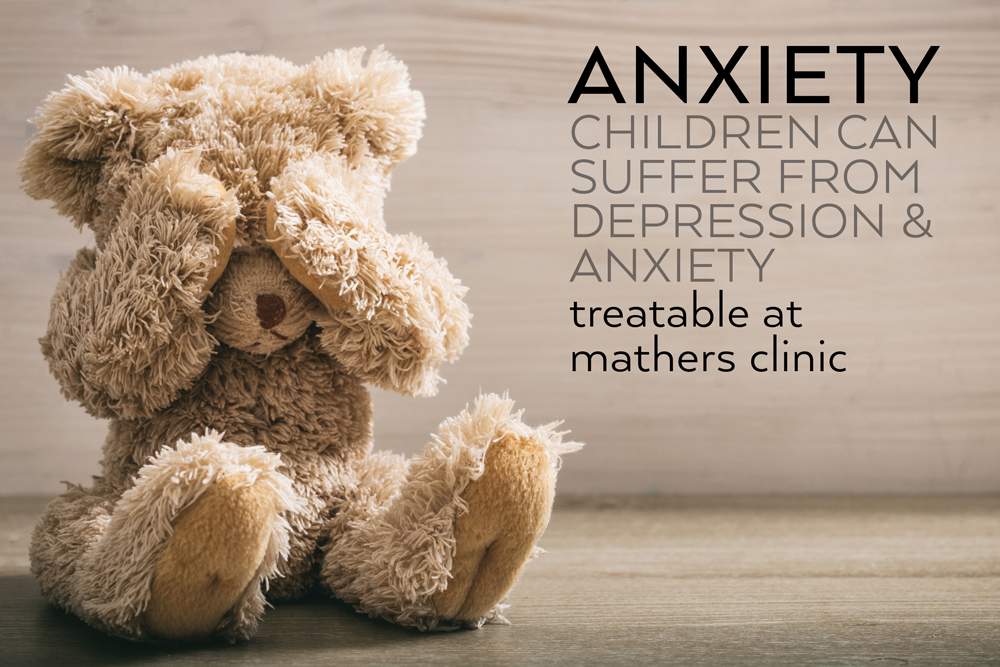ANXIETY SPECTRUM DISORDERS
OUR SERVICESAnxiety Spectrum Disorders – Effecting More Than 40 Million People
Anxiety
Anxiety is the most common mental health problem in the United States with more than 19 million people suffering from this condition. It can occur even when there is no obvious situation to cause anxiety. Some people confuse anxiety and fear. Fear is purely an emotional response to an immediate threat whereas anxiety fight or flight reaction. It becomes a problem when it interferes with day-to-day life.
These are some of the symptoms that people with anxiety have but they are not exclusive to it: excessive sweating, increased heart rate or blood pressure, restlessness, fatigue, nausea, dizziness, irritability, muscle tension, headaches, difficulty concentrating, fear of death and unrealistic view of problems.
To overcome anxiety, it is essential that you have a commitment to change. At Mathers Clinic, we can help you identify the nature of your anxiety in its severity. We will design a personalized treatment plan, that will produce results, and best meet your needs.
Facts About Anxiety Spectrum Disorders
Anxiety helps us get out of harm’s way and prepare for important events and it warns us when we need to take action. Unfortunately, it can become an excessive, irrational dread of everyday situations, that can be disabling. When anxiety interferes with daily activities, you may have an anxiety disorder.
The term “anxiety spectrum disorder” refers to generalized anxiety disorder (GAD), obsessive-compulsive disorder (OCD), panic disorder (PD), posttraumatic stress disorder (PTSD), social anxiety disorder (also called social phobia), and specific phobias.
Anxiety spectrum disorders are the most common psychiatric illnesses in the U.S., affecting 40 million adults in the U.S. age 18 and older (18%) of U.S. population.
- Anxiety disorders are highly treatable
- Almost one-third of the country’s 148 billion total mental health bill is claimed for anxiety spectrum disorders
- Anxiety disorders develop from a complex set of risk factors, including genetics, brain chemistry, personality and life events.

Categories of Anxiety Disorders:
Generalized Anxiety Disorder: GAD is characterized by persistent, excessive, and unrealistic worry about everyday things, even when there is no apparent reason for concern. Possible causes may be due to financial, health, family, work, or disaster issues. GAD is diagnosed when a person worries excessively for at least 6 months.
Obsessive-Compulsive Disorder: OCD patients suffer from unwanted and intrusive thoughts that they can’t seem to get out of their heads (obsessions), often compelling them to repeatedly perform ritualistic behaviors and routines (compulsions) to try to ease their anxiety. This may include excessive worries about dirt, germs, excessive hand washing, checking things over and over, having to do things “just right,” or repeating actions over and over until they “get it just right.”
Panic Disorder & Agoraphobia: PD is diagnosed in people who experience spontaneous seemingly out-of-the blue panic attacks and are preoccupied with the fear of a recurring attack. In agoraphobia, people stop going into situations or places in which they feel immediate escape might be difficult, such as shopping malls, public transportation, or large sports arenas. They fear not being able to get back to their “safe” place, which is usually home.
Post-Traumatic Stress Disorder: PTSD is a serious potentially debilitating condition that can occur in people who have experienced or witnessed a natural disaster, serious accident, terrorist incident, sudden death of a loved one, war, violent personal assault such as rape, or other life-threatening events. PTSD often occurs with depression, substance abuse, or other anxiety disorders.
Specific Phobias: One develops fear of new places, high bridges, old elevators, animals, snakes, flying on airplanes, thunder, dental or medical procedures, and public transportation. These phobias can disrupt daily routines, limit work efficiency, reduce self-esteem, and put a strain on relationships because they usually try to avoid these situations at all costs. Some are developed in childhood and some arise unexpectedly.
Social Phobia: SP is an extreme fear of being scrutinized and judged by others in social or performance situations. Although they recognize the fear is excessive and unreasonable, people with social anxiety disorder feel powerless against their anxiety. They are terrified they will humiliate or embarrass themselves. Examples would be public speaking, attending parties, starting relationships, academic situations, or perhaps interviewing for a new job.
Perfectionism: Perfectionism is often a common thread with many anxiety disorders, especially OCD. It is good for us to be organized and structured in our lifestyles, sometimes perfectionism can interfere with our daily life. Examples would be rigidity following rules, everything has to be equally important, mistakes are viewed as catastrophic, having to repeat things until it feels/looks/sounds “right.” Spending too much time being perfect, one may miss deadlines and suffer from procrastination.
Treating Anxiety At Mathers Clinic
The staff at the Mathers Clinic have over 35 years of experience in assessment and treatment of anxiety disorders. Treatment planning is comprehensive and performed in a “team” concept. Treatment may include cognitive/behavioral therapy, exposure and response prevention techniques, stress inoculation, biofeedback, and psychopharmacology.
Contact Mathers Clinic
Contact us to schedule an appointment with a psychiatrist or for more information about our services by calling (815) 444.9999. You may also email us at info@themathersclinic.com. We look forward to helping you meet with a psychologist at a time that works well for you.
815.444.9999 |
|
Download Self-Rating Scale
Please download, print and fill out the scales. Do you need Adobe Acrobat Reader DC? It’s free – CLICK HERE.
Anxiety: Children & Adolescents
Does your child have anxiety? Most childhood anxiety is experienced over a short period of time where as severe anxiety can last a lifetime if not treated. Children suffering from anxiety are often extremely tense or uptight. At times they may need reassurance, and their worries can interfere with activities. Parents may miss the symptoms of an anxious child being too: quiet, compliant, and eager to please. Parents should be aware of the signs of severe anxiety so they can intervene early to prevent lasting complications.


Respectfully Caring for the Emotional Well Being of Individuals & Families.
Crystal Lake Office
145 South Virginia Street
Crystal Lake, Illinois 60014
phone: 815.444.9999
fax: 815.986.1363
Monday 8:00am - 7:00pm
Tuesday 8:00am - 7:30pm
Wednesday 8:00am - 6:00pm
Thursday 8:00am - 5:00pm
Friday 8:00am - 5:00pm
Saturday 9:00am - 12:00pm
Sunday Closed
Woodstock Office
715 West Judd Street
Woodstock, Illinois 60098
phone: 815.444.9999
fax: 815.986.1363
Monday 9:00am - 5:00pm
Tuesday 9:00am - 7:00pm
Wednesday Closed
Thursday 9:00am - 7:00pm
Friday 8:00am - 5:00pm
Saturday Closed
Sunday Closed
Mathers Community Mental Health Center Affiliates:
THE MATHERS RECOVERY
Federally licensed facilities for opiate/opioid treatment. Full range service for detoxification.